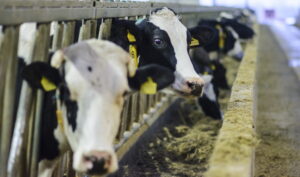
China has taken a new step in the race for leadership in future communications technologies. Scientists from Peking University and City University of Hong Kong have developed the world’s first universal 6G chip, which is capable of delivering data transfer speeds of over 100 Gbps and operating at any frequency in the range from 0.5 to 115 GHz. This was reported by the South China Morning Post and Interesting Engineering, citing a publication in Nature magazine.
The finger-sized device (11×1.7 mm) allows you to download, for example, a 50 GB 8K video in a matter of seconds.
The modem uses a photon-electron architecture, which allows different frequency bands to be combined into a single system.
The development solves a key problem for future 6G networks: spectrum fragmentation. Currently, equipment is created separately for “low,” “medium,” and “millimeter” frequencies, which complicates implementation. The new chip is universal and can be used both in rural areas (for low-frequency coverage) and in megacities (for ultra-fast connections at high frequencies).
Prototypes that transmitted data at a speed of 100 Gbit/s over limited distances were previously demonstrated in Japan, and an experimental 6G network was launched in China in 2024. However, it is the Chinese universal modem that has covered the entire frequency range for the first time, making it unique.
The next step is to integrate the technology into compact USB-format modules and adapt it for smartphones, base stations, and Internet of Things devices. This will bring us closer to the mass adoption of 6G, which experts expect in the 2030s.
China is cementing its leadership in 6G development by offering the world a unique solution that could change the landscape of mobile technology. The breakthrough universal modem opens up opportunities for a digital revolution — from medicine to the entertainment industry.

The Federal Appeals Court ruled that most of Donald Trump’s tariffs exceed his powers as president.
The so-called reciprocal tariffs imposed on almost all countries that trade with the US are illegal, the US Appeals Court ruled on Friday.
The ruling upholds a May decision by the International Trade Court, which also rejected Trump’s argument that his global tariffs were permitted under the International Emergency Economic Powers Act.
The court did not strike down the tariffs, but said they would remain in effect until mid-October, setting the stage for further legal action in the US Supreme Court.
Much remains unknown, but here is what we understand at this point about the court’s decision and what it could mean for the US president’s flagship policy.
In its 7-4 decision, the appeals court upheld the lower court’s conclusion that President Trump did not have the authority to impose global tariffs.
This was mainly because of the law Trump used to justify his policy, the International Emergency Economic Powers Act (IEEPA), which, according to the judges, does not give “the power to impose tariffs, duties, etc., or the power to levy taxes.”
The US Court of Appeals rejected Trump’s argument that the tariffs were permitted under his emergency economic powers, calling the levies “invalid because they violate the law.”
Trump immediately rejected the ruling, writing on Truth Social hours after it was handed down that the appeals court was “very biased” and that the ruling was a ‘disaster’ for the country.
“If this ruling stands, it will literally destroy the United States of America,” he wrote.
This law, passed decades ago and repeatedly invoked by Trump during both of his terms in office, gives the US president significant powers to respond to emergencies within the country or serious threats from abroad.
The 1977 law states that the president may use a range of economic levers “to counter any unusual and extraordinary threat that originates wholly or in substantial part outside the United States and is directed against the national security, foreign policy, or economy.”
It was used by both President Barack Obama and Joe Biden, who invoked the law to impose sanctions against Russia after its illegal annexation of Crimea in 2014, and then again after its full-scale invasion of Ukraine eight years later.
However, the appeals court said in its ruling that the emergency law “does not grant the president broad authority to impose tariffs.”
The IEEPA “does not mention tariffs (or any synonyms thereof) and does not contain procedural safeguards that would clearly limit the president’s authority to impose tariffs,” they said.
Trump, in announcing the imposition of global tariffs, argued that trade imbalances were damaging US national security and therefore constituted a national emergency.
However, the court ruled that imposing tariffs is not within the president’s authority and that “the power to dispose of public funds (including the power to levy taxes) belongs to Congress.”
In addition to being a significant blow to the central point of President Trump’s agenda — tariffs — the federal appeals court’s decision could have a direct impact on the US economy and cause a chain reaction in global markets.
“Businesses will be subject to uncertainty,” said Dr. Linda Yue, an economist at Oxford University and London Business School, on BBC Today.
While countries wait to see if the Supreme Court will take up the case, which seems likely, they may decide to suspend business with the US.
If that happens, Dr. Yue said, it could “weaken economic activity.”
There are also significant implications that could play out in the political arena.
For example, if the Supreme Court overturns the federal appeals court’s decision and sides with the Trump administration, it could set a precedent that encourages the president to use the IEEPA more aggressively than he has done so far.
The case will likely be referred to the highest court in the US, as Trump announced on Truth Social.
“Our indifferent and short-sighted politicians have allowed tariffs to be used against us,” Trump wrote. “Now, with the help of the US Supreme Court, we will use them for the benefit of our nation and make America rich, strong, and powerful again!”
The conservative majority in the US Supreme Court could potentially increase the likelihood that it will support the president’s position.
Six of the nine justices were appointed by Republican presidents, including three by Trump during his first term in the White House.
However, the court is also more critical of presidents when it believes they exceed their authority on issues not approved by Congress.
For example, during Joe Biden’s presidency, the court expanded what it called the “major question doctrine” to invalidate Democrats’ attempts to use existing laws to limit greenhouse gas emissions from power plants and forgive the student loan debt of millions of Americans.
The federal appeals court split 7-4 in its ruling that nearly all of Trump’s tariffs are illegal. It has now given the US administration until mid-October to appeal to the US Supreme Court in a case that has implications for both the US economy and its trade relations with the rest of the world.
If the Supreme Court upholds the ruling, it could cause uncertainty in financial markets.
Questions will arise about whether the US will have to return the billions of dollars it has collected in import duties on products from countries that have paid them over the past few months.
It could also call into question whether major economies, including the UK, Japan, and South Korea, will be bound by the individual trade deals they have negotiated with the US before the August deadline. Other trade deals currently under negotiation could also be thrown into chaos.
If the appeals court ruling is upheld, it will also deal a huge blow to Trump’s political authority and his reputation as a negotiator. But if it is overturned by the Supreme Court, it will have the opposite effect.
This decision concerns Trump’s “reciprocal tariffs,” which include a set of different rates for most countries in the world, including other taxes imposed on China, Mexico, and Canada.
These import duties on almost all goods from almost all countries with which the US trades will remain in effect until mid-October.
After October 14, they will no longer be in effect, the appeals court said.
Separately, tariffs on steel, aluminum, and copper, which were imposed under other presidential powers, will remain in effect and will not be affected by the court’s decision.

Canada’s economy contracted by 1.6% year-on-year in the second quarter, according to the country’s statistics agency. Analysts polled by Trading Economics had expected a more moderate decline of 0.6%. Compared to the previous quarter, Canadian GDP fell by 0.4%.
According to revised data, in the first quarter, the Canadian economy fell by 2% year-on-year but rose by 0.5% quarter-on-quarter. Canadian exports fell by 7.5% in April-June, while imports fell by 1.3%.
Meanwhile, consumer spending rose by 1.1% and government spending by 1.8%.
Earlier, the Experts Club information and analytical center made a video analysis of the prospects for the Ukrainian and global economies. For more details, see the video — https://youtu.be/kQsH3lUvMKo?si=F4IOLdLuVbYmEh5P

Poland has deported 15 Ukrainian citizens who “posed a threat to public safety and order in Poland” and handed them over to the Ukrainian side, Polish broadcaster RMF24 reported.
“15 Ukrainian citizens were deported from Poland. They were forcibly brought to the border by border guards and handed over to the Ukrainian side,” the broadcaster said in a statement on its website on Saturday.
Polish border guards claim that the 15 Ukrainians who were expelled from the country had been repeatedly convicted of theft, robbery, and drunk driving. According to them, they “posed a threat to public safety and order in Poland.” In one case, a Ukrainian was on the list of persons whose stay in Poland is considered undesirable.
The people covered by this procedure had been repeatedly convicted of crimes and offenses. These included theft, robbery, possession of narcotic and psychotropic substances, document forgery, drunk driving, and organizing illegal crossings of the Polish border. In addition to being expelled from the country, they were also banned from entering Poland for 5-10 years.
“Poland is a friendly country, open to foreigners. However, there has been and will be no tolerance for violations of the law by them, regardless of their country of origin. The Ministry of Internal Affairs and Administration will respond decisively to violations of our legal order,” said ministry spokeswoman Karolina Halecka, as quoted by the publication.
It is noted that since the beginning of the year, 1,100 foreigners have been forced to leave Poland.
As reported, Polish Prime Minister Donald Tusk announced in early August that after riots at a concert by Belarusian rapper Max Korzh at the National Stadium in Warsaw, 57 Ukrainians would have to leave the country.

Astarta, Ukraine’s largest sugar producer, increased its average cattle herd to 29,000 head (+4%) in January-June 2025.
According to data published by the holding company on the Warsaw Stock Exchange, in the first half of this year, Astarta increased milk yield per cow by 3% to 28 kg/day, which led to a 2% increase in milk production to 63,000 tons.
Revenue in the segment grew by 17% to EUR29 million due to an 11% increase in prices and a 2% increase in sales volumes.
Gross profit decreased by 11% compared to the same period last year to EUR13 million, reflecting higher costs and a revaluation of BA during Q1 2025. Gross margin decreased from 57% to 43% in the first half of 2025.
EBITDA amounted to EUR12 million compared to EUR15 million in the first half of 2024.
The agricultural holding estimated its share in milk production in Ukraine at 3%.
Astarta is a vertically integrated agricultural holding operating in eight regions of Ukraine and the largest sugar producer in Ukraine. It comprises six sugar factories, agricultural enterprises with a land bank of 220,000 hectares, dairy farms with 22,000 head of cattle, an oil extraction plant in Hlobyn (Poltava region), seven elevators, and a biogas complex.
In 2024, Astarta increased its net profit by 34.5% to EUR83.25 million, while its consolidated revenue decreased by 1.1% to EUR612.15 million.
In the first quarter of this year, the agricultural holding’s revenue fell by 24.9% to EUR124.58 million, while net profit fell by 28.8% to EUR6.42 million.

Agroholding Agrotrade received UAH 120 million in financing from Raiffeisen Bank as part of the European Bank for Reconstruction and Development (EBRD) risk-sharing program, the agroholding’s press service reported on Facebook.
It is noted that these funds will be used to cover seasonal needs: payment for agricultural services, purchase of fertilizers and plant protection products, as well as preparation for a new production cycle.
In addition, the company will attract an EBRD grant under the Human Capital Investment Incentive Program. It will be used to improve working conditions for employees and will be financed by the Kingdom of the Netherlands through the EBRD’s Special Crisis Response Fund.
“This result is the culmination of a year and a half of work with the EBRD. The negotiations were not easy, as our assets are located in the northeastern regions of Ukraine, which are considered high-risk. But we have proven that we are able to work effectively in any conditions, maintaining transparency, discipline, and responsibility to our partners,” said Antin Zhdanov, Deputy CEO for Economics and Finance at Agrotrade Group, whose words are quoted in the press release.
“Our cooperation with the EBRD under the risk-sharing program makes credit financing more accessible for agricultural companies, even in frontline regions. This has a positive impact on the recovery of the economy and the agricultural sector in particular,” said Larisa Bondareva, Deputy Chair of the Board of Raiffeisen Bank.
Analyzing the advantages of the project, the agricultural holding explained that Agrotrade gained financial flexibility and was able to purchase resources for production cycles on time, Raiffeisen Bank received guarantees for part of its loan portfolio, and the EBRD implemented its strategy of supporting business in regions affected by the war.
The Agrotrade Group of Companies is a vertically integrated holding company covering the entire agro-industrial cycle (production, processing, storage, and trade in agricultural products). It cultivates over 70,000 hectares of land in the Chernihiv, Sumy, Poltava, and Kharkiv regions. Its main crops are sunflower, corn, winter wheat, soybeans, and rapeseed. It has its own network of elevators with a one-time storage capacity of 570,000 tons.
The group also produces hybrid seeds for corn, sunflower, barley, and winter wheat. In 2014, a seed plant with a capacity of 20,000 tons of seeds per year was built on the basis of the Kolos seed farm (Kharkiv region). In 2018, Agrotrade launched its own brand, Agroseeds.
The founder of Agrotrade is Vsevolod Kozhemyako.